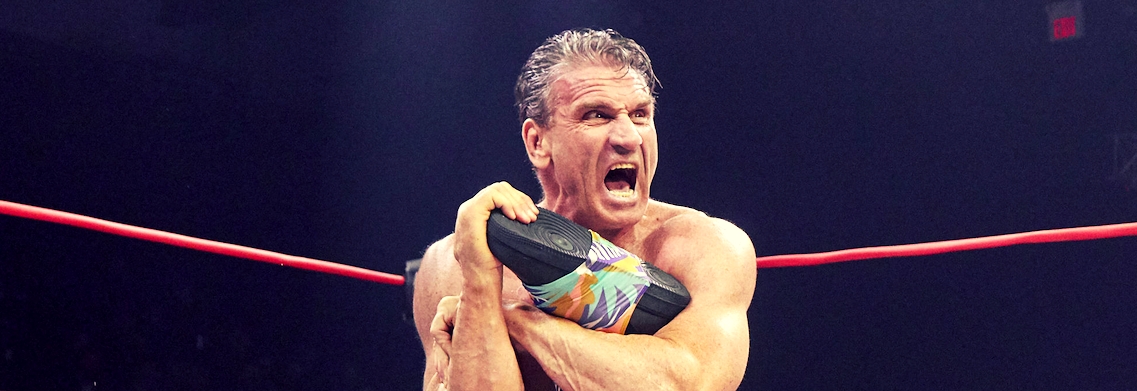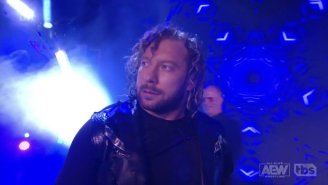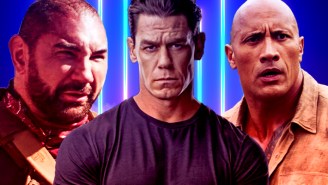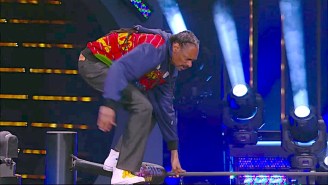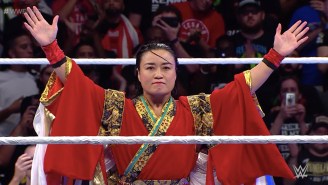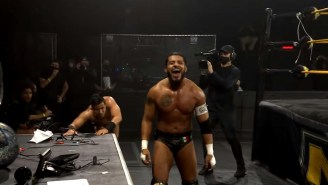Ken Shamrock has retired from MMA, but his work in combat sports and entertainment is far from over. 2019 saw the UFC legend return to Impact Wrestling and launch Valor, a bare-knuckle boxing promotion. It’s the latter Shamrock was initially most eager to talk about when With Spandex spoke to him at the AXS TV studio, starting to expound on the benefits of MMA without gloves before we started recording. He later opened up about other topics including Impact, his early MMA career in Japan, and his involvement in the CBD industry. That conversation is below and has been edited for length and clarity.
With Spandex: What made you decide to get involved in the bare-knuckle boxing world?
Ken Shamrock: Well, it had to do with the love of it. You know, when I first started out way back in ’88, ’89 over in Japan, it was open hand, and it was still the grappling and all that. And then the UFC came in and it was no holds barred and it was all bare-knuckle, and when I did that, I was like, “Wow, it doesn’t get any more real than this.”
I mean, this was truly combat sport. Maybe a little bit beyond combat sport because of the nature of there were no rules. So being able to see it get organized with, you know, you couldn’t punch a guy in the back of the head, you couldn’t knee them when they were on the ground, you couldn’t kick them in the head when they were on the ground, it made it a lot more of a combat sport then. Catching someone’s back when you throw the hooks in and you go to submit them, you know, was pretty much a 90% chance of finishing the fight. Dropping back for legs and getting a leg and presenting the heel hook or an Achilles lock, being able to finish a fight was 90% successful.
Then they put gloves on and it took away the percentage of the submissions because there was a big glove on there. The purity of that was gone. Same thing with the striking, being able to hit somebody. If you threw a proper punch, you would be rewarded with a knockout. If you threw a bad punch, you would be rewarded with a broken hand because you hit into the hard area of the head rather than the chin or the cheek or the nose. Putting a glove on somebody now said, “Okay, now I can knock somebody out by throwing a bad punch and not being rewarded for being a good striker.”
https://www.youtube.com/watch?v=SdhJjz_1lyo
That’s what it came to when they started presenting gloves, and I knew that because I’d fought in both of them and I knew how much more fighting without gloves on was so much more pure for fighters, true fighters, to be able to go in there and do their job and be good at it, as opposed to letting guys who were just tough men come in there and just wing punches and be able to break out on submissions because they could grab the big glove and you couldn’t finish that submission because there was so much in the way of you being able to do that.
So somebody that was a tough guy, had maybe some strength, some good cardio, could win a fight by just throwing heavy hands and not even having to land ’em, just hit anywhere on the head. And same with the submissions, being able to block those submissions because they didn’t have to be real good at defending that, they just had to grab the glove. And so it took away the guys that were really professional fighters.
There are people who are kind of off-put by bare-knuckle boxing because it seems so outlaw and so much just like people fighting, but it seems like you think it’s like more of a pure sport than what MMA is now.
What it reminds me of is the same people back in the day when UFC first came out, and they were screaming “This is brutality. These guys are animals. They’re pigs. They should be put in prison.” I mean, I heard all this because I was the face then. Those were the same people that are saying now that UFC is good, that the MMA market is now good, even though they didn’t like it back then, but now they’re saying it’s good.
Those same people with bare-knuckle boxing, they’re saying the same thing that they said about the sport they love now because they were uneducated. They saw something that other people, other political people said was brutal. It wasn’t a combat sport; it was animals in there fighting. “We shouldn’t let this be legalized. This could get someone killed,” because no one had an understanding of what was happening in there, the professionalism that was going on.
https://www.youtube.com/watch?v=neP5mgRygO8
The same thing’s happening now that we’re taking the gloves off people… But the reality is this: It’s not more dangerous. There is no proof out there that by hitting someone with a fist as opposed to a glove it’s more dangerous. In fact, it even speaks to the difference in that because when you talk about being able to throw a punch, if I was to throw a punch with this hand without a glove on and I was to hit you in the wrong spot… my hand’s going to break. Right? I can’t hit you in the head a hundred times.
Now I have to go fight in there with no gloves on, and I have to slow down my punches. I have to be more accurate. Because I know as a fighter if I miss this soft issue area and I’m throwing hard, fight’s over for me. I’m going to lose. I can’t fight with one hand. So I slow down and I start tagging by shots, making sure I hit my spots, because I know I’m still going to knock him down. I don’t need one hundred percent power. And I can’t punch you in the head a hundred times per round because I’m going to hurt my hand, so I have to be more accurate. The more punches that I throw, the more chances I have of hurting my hand. The less punches and the more accurate I am, the less chance I have of hurting my hand, so take the gloves off and it’s safer because I’m not taking as much brain damage.
Your brain on the inside of your head is filled with fluid, right? So no matter how hard that thing on the outside of your head is, it doesn’t have an effect on how many times your brain is bouncing off on that fluid. What has the effect in there is how many times is your brain bouncing off the side of your head in that fluid.
Are there any other rules in UFC or other mainstream MMA that you think are not good for the sport, other than, it seems like, adding gloves?
I’m not saying it’s good or bad, because I did it and I loved it. Even with the gloves on it was great. But it does take away the purity. I mean, it really did.
I couldn’t do leg locks anymore because I had this big old thing around my wrist and when I went for an Achilles lock there was padding on it so I couldn’t use this bone to put pressure on the back of the ankle to make the guy tap out because I had a soft glove on there, so it wasn’t the same thing as this bone. Same thing with the heel hook. The heel hook, you’re catching the heel in this thing here to be able to turn it. With a glove on there, this thing sticks up as high as a thumb on now, so there’s no pocket in here for me to catch the heel. So it takes away my submissions.
Same thing with chokes. When I’d get on somebody’s back, I’ve got the hooks in, I go to finish it – most of the time when somebody caught somebody’s back in a fight back in the beginning days, people went nuts because they knew the fight was over, pretty much. You had to be really good to get out of that. Really good. But now guys could just lay there, they could see that glove on there, they could grab the inside of that glove, now they’re holding your hand. Now you’re stuck. They’re going to stand you up. I’m not saying it wasn’t fun and it was, but it definitely took away the purity of fighting.
Really early in your career, you were involved in UWF doing shoot style wrestling. Looking back, how important was that and being in Pancrase to your MMA career later?
Well, I’ll tell you, if you look at the style [in Pancrase], you could escape to the ropes. You had three escapes or five escapes depending on what the match was set up for. You had knockdowns, the open hand strikes, closed fist to the body. On the ground you could only do submissions, you couldn’t punch. And what it did was it made you be good at striking because in the standup it was all just striking… but once you hit the ground it was all submissions. You couldn’t ground and pound somebody. It was all submissions.
So it forced you to be good at standing up and it forced you to be good on the ground, as opposed to when UFC came in, you could have guys who were wrestlers take guys down. They didn’t need to know one thing about submissions because they could just ground and pound you and win. In those days, it really pushed me – and that’s why when people talk about the first well-rounded fighter ever in the UFC, the first one would be me – because I was forced to do that over in Japan because when we hit the ground it was straight to submissions. Standup [it was] straight to kickboxing, so it forced me to be good at both.
The past couple years, they’ve been doing around Wrestlemania a show called Bloodsport that’s supposed to be kind of UWFi style. Josh Barnett’s in charge of it now. Have you seen any of that, or do you have any opinion on people kind of trying to bring back that style of wrestling a little bit?
I love it. I think there’s a place for it. It’s entertainment. As long as they’re not trying to put it over as being something legit, you know, and that it’s entertainment, then I’m fine with it. I did it. I did it went I first went over to Japan with the UWF, that’s what it was, and also Fujiwara Gumi – Pancrase was the first time I ever did a real shoot in front of a crowd – so I love it. I think it’s awesome and I think the fans will love it too.
Because I think wrestling right now, things change, and I think people are looking for something that’s going to be more realistic than watching someone walk around and do – there’s room for that too, but there’s got to be some sort of mixture of what people think is real and isn’t real, especially in pro wrestling.
I know in Impact you did a match with Joey Ryan that involved one of the more unrealistic famous moves in wrestling right now –
(laughs) What do you mean unrealistic? I was mesmerized, man! Come on! Don’t kill me on that. I didn’t do that on purpose. I would never do that. (laughs)
Something else in Impact that people might find controversial because it’s too unrealistic or this or that is Tessa vs. Sami as the next world title match. What do you think about that in regards to realism in wrestling?
People need to get over this, man. I mean, the times are changing. Women are tough and if they don’t think so, then they need to step in and start looking at some of the UFC women. Blanchard’s no different. She’s a beast, and Sami’ll tell you the same thing if he’s telling you the truth, right? He’ll tell you, “Yeah, she’s tough.” So yeah, people just need to get over that sixties and seventies and eighties though process because we’re going into new times.
Your match with Moose included you doing some over the top rope moves. What made you decide to break that out in that match?
I just wanted to do something I hadn’t done before, you know? And I wanted to make a statement. I wanted everybody to know that I don’t want pity, I don’t want any sympathy, I don’t want anyone thinking that I’m 55 coming in there and trying to collect a paycheck and I can’t perform like the rest of them, you know.
That’s something I didn’t want anybody to think, so it was important to me going into that first one to really put that out, just stomp that fire out, because I would never put myself in that position to not belong. Every time I walk into the ring, I’m going to earn my spot, and if anybody questions me then they can get in a ring with me. And that’s something I’ve prided myself from the time I started entertaining in front of people was that I would never cheat my fans. I would never do that.
Is there anyone [in Impact] you’ve seen since you’ve come back who you’re interested in working with?
Absolutely. Brian Cage, for one. Me and him got this whole thing started, you know? Why we haven’t had a match yet, it’s shocking… It’s been an honor to get in the ring and work with the guys I have up to this point and for them to give me an opportunity at my age. They don’t know me. They didn’t know how I was going to perform, but they gave me a chance, so I was really appreciative of that, that they had the trust that I wasn’t going to sell them short. For that, I’m grateful and I’m very appreciative.
https://www.youtube.com/watch?v=WW4DTkYWEoQ
You’re also involved in what’s going on right now with CBD. What made you interested in that?
Well, first of all, I was against it. When I first heard about it, I thought it was just people finding ways to get high. You know, like I said, I’m one of those people that I believe in working hard for what you get. I came from nothing, I came from a lot less than nothing… and listen, some of the stuff I had to do to get where I wanted to be was brutal, but I made it. And then I see other people getting stuff handed to them. And so I thought this is just another way for people to check out, for the government to pass out these drugs and make money off the American people and then when there’s problems with it, they blame a drug dealer.
But, you know, I just said, you know, I’ve seen it happen with my brother. I watched him be a violent person, just a really high out of control person when he lost his temper, and then they put him on this stuff and I was like, “Wow. What a bunch of idiots.” And then I watched this guy become Doctor Jekyll and Mister Hyde, a completely different personality, different character.
I would have never believed it if someone told me except for that I saw it with my own eyes, and so from that point on, I did a lot more research on it. I’m even involved with people now who are in that industry because I believe that this is what God, when they said in the Bible that everything we need is right here on earth… that this is something that God put here to help people with whatever issues they have, and I believe that it works and I know it works.
When you’re dealing with recovering, whether you’re working out or wrestling or fighting, is that something you look for, like natural [recovery methods?]
Yeah, I don’t use it because that’s not something that I do because I don’t feel I need to use that stuff. I just don’t. If there was a time that I needed to, I wouldn’t hesitate, but I’m healthy. I eat good, I train hard, I’ve always done my physical therapy whenever I had surgeries and I’ve always come out the other side feeling good. So me personally, I’ve never had to use it. But I’ve seen it work, and I’m a believer in it.
I’m fortunate to be able to do the things that I’ve done and still be able to recover and still be able to be in great shape, but I know there’s a lot of people out there that don’t get that luxury. They work 80 hours, you know, they’re constantly working and doing stuff. They don’t get to go to the gym. By the time they get home they got kids to feed and raise and take them to practices and all these other things, and I see it. They’re working just as hard as I am, maybe even harder because they’re living an everyday life, so they don’t get that chance to stay fit constantly. It’s my job.
So yeah, I should be fit and in good health, but a lot of these people, eighty percent of the workforce out there don’t get that luxury. And something like this gives them that luxury to be able to feel good, to be able to take care of all these issues. They may have a bad back, bad knees, bad shoulders, whatever it is. They don’t got time to spend an hour at a physical therapy place because they’ve got be home. I’m not blind to how the world works and that’s why I believe these things that we have there that are from God’s great earth to be able to put out there for people to be able to live a better life.
What do you think about another UFC-wrestling connection, Cain Velasquez getting involved in lucha libre and WWE?
Love it. I’m the one who built the bridge for that and I think people should use more of that. You know, we live a very short time in this world, when you talk about what the time frames are, right? And people gotta live their lives, man. Don’t live a certain part of your life and then say “Okay, I’m over it.” There’s so much more out there.
I lived the life from the time I was a young kid trying to make it in the world constantly striving to find a place I belonged, and then I got my professional career and I lived that one and it was awesome, but now I’ve got another one to live, I’ve got another life to live. I’m a promoter. I’m a professional wrestler. I’m an entertainer. I’m going to live that as long as I can and then when that’s over I’m going to live my life as being a granddad, as being a family guy.
I’m living that too alongside all this other stuff, but I’ll get to focus on that, but when I focus on that I’ll be well-off. I’ll be able to be comfortable and be able to provide for my grandchildren and my great-grandchildren and be able to help them in their lives and enjoy it at the same time. I see too many times people live their lives in the workforce and then when the work’s over and they retire, they’re dead. And to me, there’s just so much more to life out there than that.

